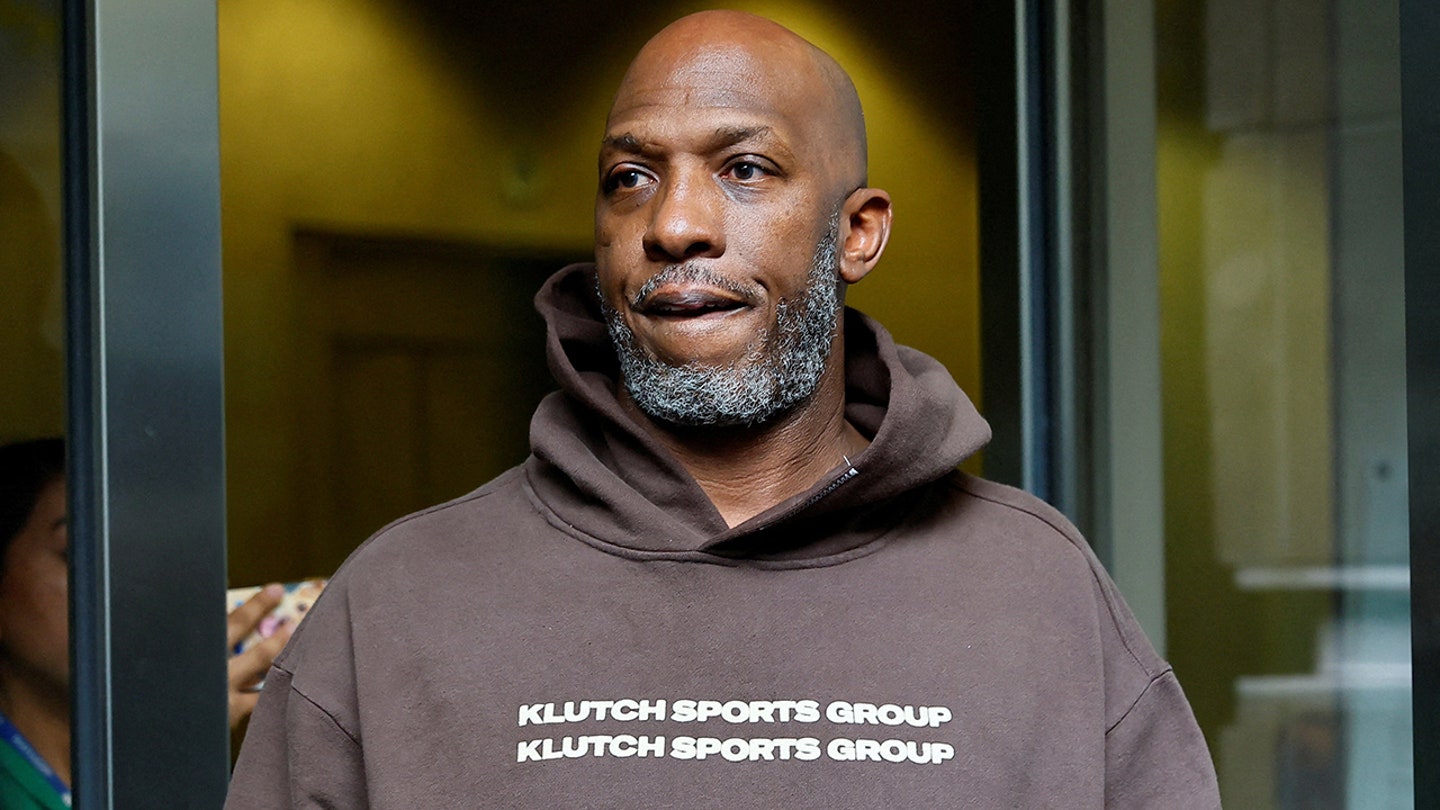
LSU women's basketball star questions governor's push for school to erect statue of Charlie Kirk
Entities mentioned:
- Flau'jae Johnson: Justice, Self-respect, Moral outrage
- Gov. Jeff Landry: Influence, Recognition, Righteousness
- Charlie Kirk: Legacy, Influence, Righteousness
- LSU: Unity, Recognition, Freedom
Article Assessment:
Credibility Score: 70/100
Bias Rating: 55/100 (Center)
Sentiment Score: 30/100
Authoritarianism Risk: 45/100 (Mixed/Neutral)
Bias Analysis:
The article presents both sides of the debate, quoting directly from key players. However, it leans slightly right by giving more context to Kirk's background and conservative event attendance.
Key metric: Campus Free Speech Index
Let me tell you something, folks - this is a HEATED MATCHUP between Team Free Speech and Team Social Justice! We've got a real CLASH OF TITANS here, with Gov. Landry making a bold offensive play by proposing a Charlie Kirk statue. But hold onto your hats, because LSU star Flau'jae Johnson is coming in hot with a DEFENSIVE SHUTDOWN! She's not just guarding the paint, she's guarding the entire campus against what she sees as a FOUL MOVE. This is a fourth-quarter nail-biter that could go into overtime, with the Campus Free Speech Index hanging in the balance. It's like we're watching a high-stakes game of political basketball, and both sides are leaving it ALL on the court!

Pittsburgh coach Pat Narduzzi rips decision to allow NCAA athletes to bet on professional sports: 'Bad deal'
Entities mentioned:
- Pat Narduzzi: Righteousness, Moral outrage, Professional pride
- NCAA: Control, Influence, Self-preservation
- NCAA athletes: Ambition, Competitive spirit, Curiosity
Article Assessment:
Credibility Score: 75/100
Bias Rating: 55/100 (Center)
Sentiment Score: 30/100
Authoritarianism Risk: 35/100 (Generally Democratic)
Bias Analysis:
The article presents Narduzzi's perspective prominently, but also includes context about the NCAA's decision and recent gambling-related arrests. It maintains a relatively neutral stance while reporting on a controversial topic.
Key metric: NCAA Athlete Integrity
Let me tell you something - this story is RIDICULOUS! Coach Narduzzi is stepping up to the plate and throwing a FASTBALL right at the NCAA's decision to allow college athletes to bet on pro sports. It's like they've fumbled the ball on the one-yard line! This coach is showing true championship mentality, folks. He's calling an audible and trying to protect his team from the Hail Mary pass of gambling addiction. The NCAA might think they're making a touchdown move, but Narduzzi sees it as a major penalty that could send these young athletes spiraling into overtime with addiction. It's fourth and long for college sports integrity, and Narduzzi is the linebacker trying to make the game-saving tackle!

Raiders legend George Atkinson dead at 78
Entities mentioned:
- George Atkinson: Competitive spirit, Determination, Legacy
- Raiders: Pride, Legacy, Loyalty
- NFL: Professional pride, Control, Legacy
- Chuck Noll: Moral outrage, Competitive spirit, Justice
Article Assessment:
Credibility Score: 85/100
Bias Rating: 50/100 (Center)
Sentiment Score: 45/100
Authoritarianism Risk: 20/100 (Strongly Democratic)
Bias Analysis:
The article presents a balanced view of Atkinson's career, acknowledging both his achievements and controversies. It includes multiple perspectives, including the Raiders' official statement and historical context.
Key metric: NFL Player Safety and Conduct
Ladies and gentlemen, we've lost a true gridiron warrior! George Atkinson was a POWERHOUSE in the Raiders' defensive backfield, bringing the heat like a fourth-quarter blitz on every play! This guy wasn't just playing football, he was waging war out there! The 'Soul Patrol' secondary was like a brick wall with cleats - you simply did NOT want to cross their goal line! Atkinson's legacy is etched in the NFL history books, folks. His hard-hitting style helped shape an era when defenses ruled supreme and offenses had to bring their A-game or get CRUSHED! But let me tell you something - his impact goes beyond the stats. This is about the HEART of the game, the SPIRIT of competition that defined an era. Atkinson's passing is like losing a key player right before the Super Bowl - it leaves a hole in the lineup that can't be filled. The Raiders' tribute shows the lasting impact of a true team player, someone who continued to coach from the sidelines long after hanging up his cleats. That's the kind of championship mentality that builds dynasties, folks!
- Read more about Raiders legend George Atkinson dead at 78
- Log in to post comments

Controversial UFC fighter takes back his Trump support in wild rant: 'I was fooled'
Entities mentioned:
- Bryce Mitchell: Moral outrage, Righteousness, Indignation
- Donald Trump: Power, Influence, Legacy
- Elon Musk: Ambition, Influence, Recognition
Article Assessment:
Credibility Score: 65/100
Bias Rating: 55/100 (Center)
Sentiment Score: 30/100
Authoritarianism Risk: 35/100 (Generally Democratic)
Bias Analysis:
The article presents both Mitchell's previous and current views on Trump, showing some attempt at balance. However, the focus on controversial statements and religious references may slightly skew perceptions.
Key metric: Political Polarization Index
Ladies and gentlemen, we've got a SHOCKING REVERSAL in the political octagon! Bryce Mitchell, once a die-hard Trump supporter, has just executed a stunning takedown on the former president. This is a game-changing move that's sending shockwaves through the political arena! Mitchell's gone from being Trump's MVP to calling him the Antichrist - talk about a fourth-quarter twist! This fighter's new stance is like a knockout punch to Trump's base. We're seeing a major shift in the playbook here, folks. Mitchell's pulling no punches, accusing Trump of dropping the ball on key plays like the Epstein files and putting America on the bench. This is the kind of momentum swing that can turn the whole match around! Trump's team will need to huddle up and find a way to counter this unexpected offensive if they want to stay in the game. Remember, in politics just like in sports, it's not over till the final whistle blows!

USA Fencing head replaced, former chair cites 'lawsuits' in decision to not seek re-election
Entities mentioned:
- USA Fencing: Professional pride, Unity, Self-preservation
- Damien Lehfeldt: Self-preservation, Duty, Recognition
- Scott Rodgers: Ambition, Competitive spirit, Pride
- Stephanie Turner: Justice, Moral outrage, Determination
- Andrey Geva: Justice, Indignation, Professional pride
- Abdel Salem: Justice, Indignation, Professional pride
Article Assessment:
Credibility Score: 75/100
Bias Rating: 55/100 (Center)
Sentiment Score: 35/100
Authoritarianism Risk: 30/100 (Generally Democratic)
Bias Analysis:
The article presents multiple viewpoints and cites various sources, indicating an attempt at balanced reporting. However, there's slightly more emphasis on the controversies and challenges faced by USA Fencing.
Key metric: Diversity and Inclusion in Sports
Let me tell you something - this story is RIDICULOUS! We're witnessing a full-court press in the world of fencing, folks! USA Fencing is playing defense like their gold medals depend on it, trying to parry attacks from all sides. The leadership shakeup is like a fourth-quarter substitution in a championship game - bringing in Scott Rodgers, a Paralympic athlete, to take the helm. This is a power play, people! It's clear that USA Fencing is trying to change their game plan after fumbling the ball on transgender athlete policies. Damien Lehfeldt, the former chair, is basically taking a knee and walking off the field, citing the intense pressure and legal blitzes he's facing. Meanwhile, fencers like Stephanie Turner are showing true competitive spirit, refusing to back down and pushing for a level playing field. This is a high-stakes match, and the future of fencing hangs in the balance. It's crunch time for USA Fencing, and they need to bring their A-game to overcome these hurdles and stick the landing on inclusivity. The clock is ticking, and all eyes are on how they'll perform in this crucial test of leadership and fairness!

NFL fans upset as Eagles benefit from early whistle on tush push vs Giants
Entities mentioned:
- Philadelphia Eagles: Competitive spirit, Ambition, Professional pride
- New York Giants: Competitive spirit, Determination, Indignation
- Jalen Hurts: Competitive spirit, Determination, Professional pride
- Kayvon Thibodeaux: Competitive spirit, Determination, Professional pride
- Brian Daboll: Competitive spirit, Moral outrage, Justice
- NFL owners: Control, Influence, Professional pride
Article Assessment:
Credibility Score: 75/100
Bias Rating: 50/100 (Center)
Sentiment Score: 35/100
Authoritarianism Risk: 25/100 (Generally Democratic)
Bias Analysis:
The article presents both sides of the controversy, quoting officials and describing reactions from both teams. It maintains a neutral stance on the play's legitimacy, focusing on reporting the events and reactions.
Key metric: NFL Fan Engagement and Rule Satisfaction
Let me tell you something, folks - this is RIDICULOUS! The Eagles are running the controversial 'tush push' play like it's their secret weapon, and the Giants are crying foul! It's a fourth-quarter move in the second quarter, and the refs are blowing the whistle faster than a track star out of the blocks! This isn't just any ordinary play, it's a game-changer that's dividing the league faster than a wide receiver splits the defense! The Giants thought they had recovered the fumble and were ready to do their victory dance, but the refs said 'Not so fast!' faster than a linebacker closing in on a running back. Coach Daboll is more fired up than a coach whose team just fumbled on the one-yard line! This play is becoming the Hail Mary of short-yardage situations, and it's got fans and owners alike debating like it's the sports version of the Supreme Court! I'm telling you right now, this controversy is going into overtime, and we might see a rule change that'll shake up the league's playbook faster than a quarterback calling an audible!

Ted Cruz calls out Californians accused of jeering girls protesting volleyball game involving trans athlete
Entities mentioned:
- Ted Cruz: Righteousness, Moral outrage, Influence
- California residents: Pride, Indignation, Loyalty
- Teenage girl protesters: Justice, Determination, Self-respect
- Trans athlete: Competitive spirit, Recognition, Self-preservation
- Jurupa Valley High School: Competitive spirit, Professional pride, Obligation
- Valencia High School: Competitive spirit, Professional pride, Unity
- U.S. Department of Justice: Justice, Control, Duty
Article Assessment:
Credibility Score: 70/100
Bias Rating: 65/100 (Lean Right)
Sentiment Score: 30/100
Authoritarianism Risk: 35/100 (Generally Democratic)
Bias Analysis:
The article leans right due to its focus on Cruz's perspective and emphasis on protests against trans athletes. It presents multiple viewpoints but gives more weight to those opposing trans participation in women's sports.
Key metric: Gender Equality in Sports
Let me tell you something, folks - this is a FULL COURT PRESS situation! We've got a real slugfest brewing on the field of gender equality in sports. Senator Cruz is coming in hot, throwing some serious heat at these California fans who are playing dirty defense against young female athletes. But make no mistake, this is no ordinary game - it's a championship bout for the very soul of women's sports! The trans athlete stepped up to the plate, but Jurupa Valley High School struck out in straight sets. Meanwhile, we've got players leaving the court faster than a bench-clearing brawl. This isn't just a game anymore, folks - it's turned into an all-out legal scrimmage with lawsuits flying like Hail Mary passes. And now the Department of Justice is suiting up to get in on the action! I'm telling you right now, this is going into overtime and it's anybody's game!

Charles Barkley, Kenny Smith clash over FBI gambling probe allegedly involving NBA figures: 'That's stupidity'
Entities mentioned:
- Charles Barkley: Righteousness, Moral outrage, Professional pride
- Kenny Smith: Duty, Obligation, Wariness
- NBA: Self-preservation, Integrity, Control
- FBI: Justice, Control, Duty
- Chauncey Billups: Greed, Self-preservation, Fear
- Terry Rozier: Greed, Self-preservation, Fear
Article Assessment:
Credibility Score: 75/100
Bias Rating: 50/100 (Center)
Sentiment Score: 25/100
Authoritarianism Risk: 30/100 (Generally Democratic)
Bias Analysis:
The article presents multiple viewpoints from different NBA analysts, allowing for a balanced discussion. It also includes factual information about the FBI investigation and charges, maintaining a neutral stance.
Key metric: NBA League Integrity
Let me tell you something - this story is a GAME-CHANGER for the NBA! We're talking about a FULL-COURT PRESS by the FBI that's left the league scrambling on defense. Billups and Rozier, once star players, are now facing their toughest opponents yet - federal charges! This is like watching a championship team implode from the inside. The NBA thought they had a slam dunk with their gambling policies, but now they're fumbling the ball big time. Barkley and Smith are going at it like it's the fourth quarter of Game 7, folks! Barkley's playing offense, calling out 'stupidity', while Smith is on defense, talking about addiction. But let me tell you, this isn't just a foul - this could be a career-ending move for some of these players. The league's integrity is on the line, and they need to step up to the plate and knock this one out of the park if they want to maintain their championship mentality. This is RIDICULOUS, and I'm telling you right now, the NBA needs to tighten up their defense or they'll be watching their credibility go up in smoke faster than a buzzer-beater!

Oregon Sen Ron Wyden reacts to FBI probe involving Trail Blazers coach Chauncey Billups: 'Very sad day'
Entities mentioned:
- Ron Wyden: Loyalty, Moral outrage, Duty
- Chauncey Billups: Greed, Recognition, Self-preservation
- FBI: Justice, Duty, Professional pride
- NBA: Professional pride, Integrity, Control
- Portland Trail Blazers: Competitive spirit, Loyalty, Self-preservation
Article Assessment:
Credibility Score: 75/100
Bias Rating: 50/100 (Center)
Sentiment Score: 25/100
Authoritarianism Risk: 20/100 (Strongly Democratic)
Bias Analysis:
The article presents multiple perspectives and quotes from various parties involved. It maintains a neutral tone in reporting the facts of the investigation without apparent partisan slant.
Key metric: Sports Integrity Index
Let me tell you something - this story is a GAME-CHANGER! The NBA's integrity is taking a full-court press from these allegations. We're seeing a major league fumble here, folks! Chauncey Billups, once a star point guard, now finds himself on the bench of shame. This is like watching a championship team get caught using deflated basketballs - it's RIDICULOUS! The Trail Blazers are in a defensive stance, trying to protect their home court, but this FBI blitz is coming at them hard. Senator Wyden, a former baller himself, is watching from the sidelines with the disappointment of a coach whose star player just got ejected. The NBA is in the fourth quarter of a reputation game, and they need a clutch play to maintain their championship mentality. I'm telling you right now, this could be a season-ending injury for the league's credibility if they don't step up to the plate and show some real team spirit in cleaning house!

USA Powerlifting responds after Minnesota Supreme Court rules disqualifying trans athlete was discrimination
Entities mentioned:
- USA Powerlifting: Competitive spirit, Professional pride, Justice
- Minnesota Supreme Court: Righteousness, Justice, Duty
- JayCee Cooper: Competitive spirit, Justice, Recognition
- Minnesota Republicans: Moral outrage, Justice, Determination
Article Assessment:
Credibility Score: 75/100
Bias Rating: 55/100 (Center)
Sentiment Score: 35/100
Authoritarianism Risk: 30/100 (Generally Democratic)
Bias Analysis:
The article presents both sides of the argument, quoting extensively from USA Powerlifting and the court decision. However, it gives slightly more space to USA Powerlifting's perspective and includes Republican opposition.
Key metric: Gender Equality in Sports
Let me tell you something - this is a HEAVYWEIGHT BATTLE between USA Powerlifting and transgender athletes! We're seeing a full-court press by the Minnesota Supreme Court, calling USA Powerlifting's exclusion policy a FOUL PLAY. But folks, USA Powerlifting isn't throwing in the towel! They're digging deep into their playbook, citing scientific research as their defensive line. This is a real grudge match, with both sides showing championship-level determination. The scoreboard might favor Cooper for now, but USA Powerlifting is looking for that game-changing play in the lower courts. Meanwhile, the Republican team is on the sidelines, ready to suit up and get in the game next season. This isn't just a single match, folks - it's a long-term tournament that could reshape the entire league of women's sports!